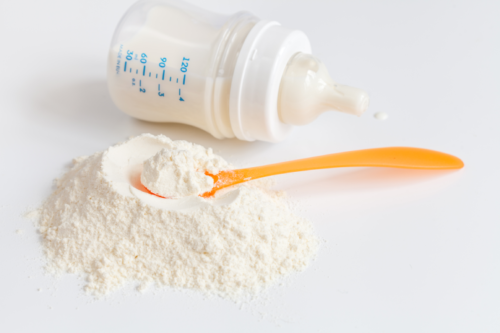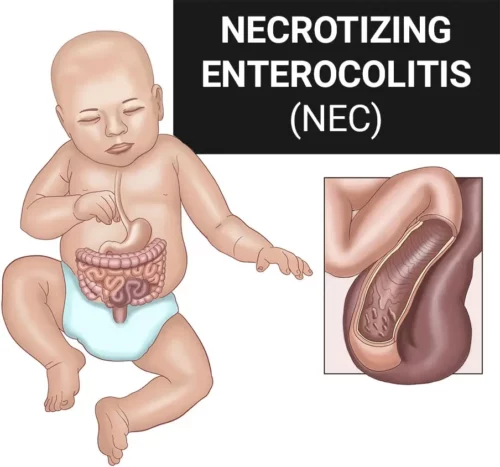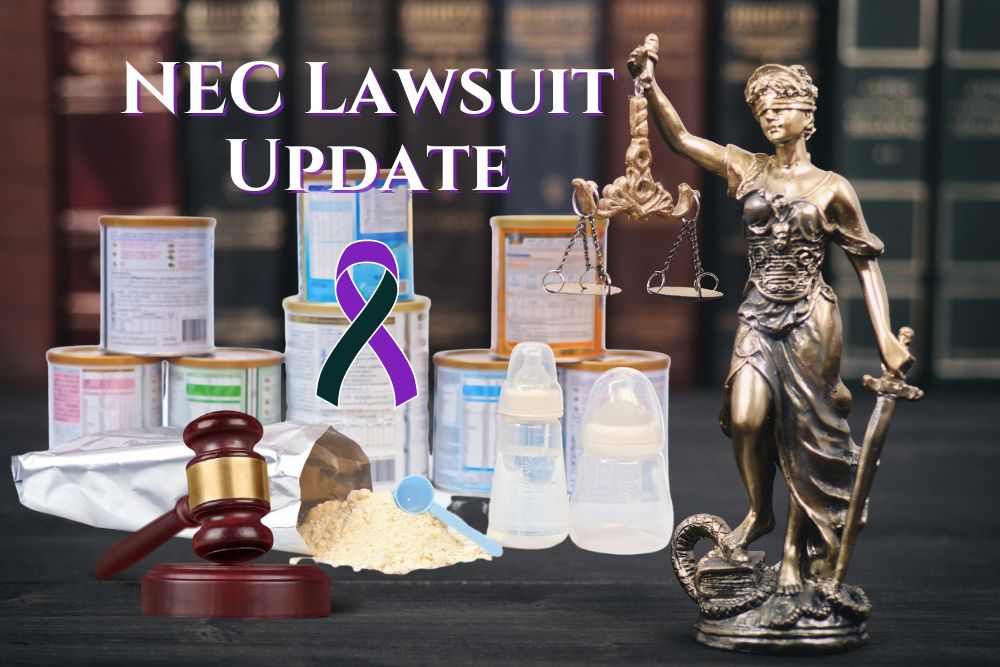
What is the Hidden Threat of NEC in Infant Formulas?
Necrotizing Enterocolitis (NEC) is a severe and often life-threatening condition that primarily affects the intestines of newborns, particularly premature infants. NEC can lead to dangerous infections, sepsis, and sometimes requires emergency surgery to manage. Over recent years, concerns have surfaced about the link between NEC and cow's milk-based infant formulas—raising questions about the safety of these products for vulnerable infants.
As lawsuits increase across the U.S., formula manufacturers face growing scrutiny for their lack of adequate warnings to parents and healthcare providers. Why weren’t families informed of these risks? How many infant lives could have been protected with clearer information? New scientific studies are shedding light on these potential risks, driving families to seek accountability and transparency from companies marketing these formulas.
In this article, we’ll delve into the hidden dangers associated with certain formulas and examine how these lawsuits are bringing critical issues to light, especially regarding product labeling and corporate responsibility for infant safety.

What is Necrotizing Enterocolitis (NEC) and Why is it So Dangerous?
Necrotizing Enterocolitis (NEC) is a life-threatening condition that primarily affects the intestines of premature infants. This illness causes intense inflammation, which can lead to intestinal tissue death and severe complications such as infection and intestinal perforation. For both parents and healthcare providers, an NEC diagnosis is alarming, as the condition can progress rapidly and often requires immediate intervention.
What causes NEC? While researchers are still investigating all contributing factors, risk elements include prematurity, low birth weight, and certain types of feeding formulas. Premature babies, especially those weighing under 3 pounds, face the highest risk, with approximately 5-10% developing NEC within their first days of life.
Recognizing symptoms early is challenging, as NEC signs like swollen abdomen, feeding intolerance, and bloody stools can be subtle. In many cases, NEC escalates swiftly, leaving families and medical teams little time to act. This makes understanding NEC’s causes even more crucial, particularly as research reveals potential links to feeding practices.
In the following sections, we’ll examine the connection between cow's milk-based formulas and NEC, shedding light on why these formulas may contribute to this devastating condition in vulnerable infants.

The Link Between Cow’s Milk-Based Formula and NEC
Growing evidence suggests a strong connection between cow's milk-based formulas and the development of NEC in premature infants. Numerous scientific studies have highlighted that premature babies fed with cow's milk-based formula face a significantly higher risk of developing NEC compared to those who receive breast milk or human milk-based formulas. But why is cow's milk-based formula so risky for these vulnerable infants?
One reason is that breast milk contains protective factors — including antibodies and unique proteins — that help build immunity and aid in digestion, reducing the risk of inflammation in the gut. Cow's milk-based formulas lack many of these essential components, leaving the intestines of premature infants more susceptible to harm. In comparison, formulas derived from human milk aim to replicate these protective qualities, presenting a potentially safer option for feeding preterm infants.
But despite these findings, cow's milk-based formulas continue to be marketed and widely used, sometimes without sufficient information provided to parents and healthcare providers. Why are these products still recommended? Are parents adequately informed about the risks? For many, these questions remain unanswered, and parents are left to make critical decisions without full transparency.
In the following section, we’ll examine what manufacturers haven’t disclosed about these formulas, as well as the safety information that could have been provided to parents and healthcare professionals.

Hidden Dangers: What Manufacturers Didn’t Disclose
One of the most alarming aspects of the NEC lawsuits is the lack of transparency from formula manufacturers regarding the risks associated with cow's milk-based products. Despite scientific evidence linking these formulas to NEC in preterm infants, many companies have not included adequate warnings on their product labels. This absence of information has left many parents unaware of the potential harm they are exposing their vulnerable infants to.
Manufacturers have also failed to inform healthcare providers about the heightened risks of NEC with cow’s milk-based formulas, leaving doctors and nurses without crucial information to guide their recommendations. This lack of disclosure has raised ethical questions: How much did manufacturers know about the risks, and when did they know it?
Even more troubling is the continued marketing of these products as safe and nutritious for preterm babies, despite known risks. Families facing the consequences of NEC are demanding answers. They ask why these products were promoted without sufficient warnings and what role marketing priorities may have played in these decisions.
What Are the NEC Lawsuits and Why Are Families Taking Action?
The NEC lawsuits have gained significant traction as families across the U.S. seek justice for harm caused to their premature infants. These lawsuits allege that formula manufacturers knowingly put vulnerable babies at risk by failing to disclose the dangers of cow’s milk-based formulas. Plaintiffs argue that these companies prioritized profits over safety, leaving parents uninformed about the true risks associated with their products.
Key allegations in these cases claim that manufacturers neglected their duty to provide clear warnings on labels and withheld crucial information from healthcare providers. Families argue that if they had known the risks, they could have made informed choices, potentially choosing breast milk or human milk-based formulas instead of the higher-risk cow’s milk formulas.
Several notable verdicts and settlements have already emerged, with some cases awarding substantial compensation to affected families. These outcomes serve as a critical reminder to the formula industry, underscoring the need for stricter regulations and transparency. Beyond compensation, the NEC lawsuits are sparking a wider conversation about product labeling, corporate accountability, and the ethical responsibilities of companies in the infant nutrition industry.
Health and Safety Risks Related to NEC
For families impacted by NEC, the health consequences are immediate, severe, and often life-altering. Infants who develop NEC can face a range of critical short-term health issues. The illness can quickly lead to intestinal perforation, where the wall of the intestine develops holes, allowing bacteria to leak into the abdomen. This often results in sepsis, a life-threatening infection that can spread rapidly. Many infants with NEC require emergency surgery to remove damaged sections of the intestine, a procedure that carries its own set of risks and long-term impacts.
However, the repercussions of NEC don’t stop after the initial treatment. Many survivors live with long-term health issues that affect their quality of life and development. Some infants face developmental delays, struggling to reach typical milestones due to complications arising from NEC. Chronic digestive issues can persist, requiring ongoing medical care, and neurological complications may arise due to the trauma the body undergoes during severe cases of NEC.
The emotional and financial toll on families is equally overwhelming. Families often face substantial medical expenses associated with emergency care, surgeries, and extended hospital stays. Long-term care costs add to the financial burden, as some children require specialized support and medical treatments well into their childhood years. The psychological trauma of watching an infant endure these hardships is profound, leaving lasting emotional scars on parents and caregivers.
The Role of Healthcare Providers
Healthcare providers are on the front lines of decision-making for the nutrition and care of premature infants, making their informed guidance crucial. However, without comprehensive information about the risks associated with cow’s milk-based formulas, providers are often left to make recommendations without full knowledge of the potential harm. As the NEC lawsuits reveal hidden dangers, many are questioning whether medical professionals have been sufficiently informed by manufacturers to make safe recommendations for their patients.
The balance between nutritional needs and potential risks is a delicate one. Premature infants require special nutrition to aid their development, and formulas are often chosen to supplement when breast milk isn’t available. Yet, with mounting evidence linking cow’s milk-based formulas to NEC, healthcare providers are beginning to consider safer alternatives, like human milk-based formulas, which more closely mimic the protective qualities of breast milk.
Providers are also increasingly advocating for clearer labeling and transparent product information, which could better support informed decision-making. With adequate warning labels and accessible research, they could guide parents in understanding the safest feeding options for their infants, ultimately helping to reduce the risks associated with NEC.
Consumer Rights and Product Safety
Parents have a fundamental right to make informed decisions about the products they use for their children, especially when it comes to something as critical as infant nutrition. Yet, in the case of cow’s milk-based formulas, many families affected by NEC argue that they were not given the necessary information to understand the potential risks. This lack of transparency brings to light important questions about consumer rights and the responsibilities of manufacturers to ensure product safety.
At the heart of these issues is the principle of informed consent. Parents deserve to know the full scope of any risks associated with a product before making a choice, particularly when safer alternatives exist. Unfortunately, as many NEC lawsuits allege, manufacturers have not always provided clear warnings on product labels or adequately informed healthcare providers, limiting the ability of parents to make fully informed decisions.
Transparent product labeling is essential not only for safeguarding consumers but also for building trust between companies and the public. With accurate, accessible information, families can make choices that align with their values and their children’s health needs. Additionally, ensuring transparency can help hold manufacturers accountable, especially when products have been linked to serious health risks like NEC.
Moving Forward: Implications of NEC Lawsuits
The NEC lawsuits have sparked a powerful movement that could bring lasting changes to the formula industry, pushing manufacturers and policymakers to prioritize safety and transparency. With more families stepping forward and courts scrutinizing the actions of formula producers, there is a growing demand for safer manufacturing practices and clearer communication about risks associated with certain products.
One major implication of these lawsuits is the potential shift in formula marketing and labeling standards. Should these cases continue to highlight the dangers associated with cow’s milk-based formulas, manufacturers may face stricter regulations requiring them to disclose risks clearly on their packaging. Such measures could empower parents and healthcare providers with the information they need to make safer feeding choices.
Beyond regulation, the NEC lawsuits are raising awareness among both the public and the medical community about the need for additional research on NEC prevention. This push could lead to new studies that deepen our understanding of how NEC develops, potentially leading to improved treatment protocols and preventive measures for preterm infants.
Finally, the attention brought by these lawsuits may lead to improved guidelines for feeding premature infants. Healthcare providers, equipped with better knowledge and safer alternatives, can offer recommendations that reduce the likelihood of NEC, giving families peace of mind.
Conclusion: Advocacy and Awareness for Safer Infant Nutrition
The journey through the NEC lawsuits and the risks associated with cow's milk-based formulas reveals a stark truth: too many parents and healthcare providers have been left in the dark about the potential hidden dangers of these products. The lack of disclosure by formula manufacturers has put countless premature infants at risk, with families now facing the devastating consequences of a preventable illness.
Raising awareness about NEC and advocating for safer alternatives are essential steps forward. Parents, healthcare providers, and advocates can play a vital role in demanding accountability from manufacturers, ensuring that future families are given the full scope of information needed to protect their children. By supporting transparency and safer practices in infant nutrition, we take a stand for a system that prioritizes the well-being of every child.
This call to action extends beyond the courtroom. Parents and healthcare professionals must stay informed, share knowledge, and encourage ongoing research into NEC prevention and treatment. Together, we can foster a safer environment for premature infants, holding companies accountable for the products they market and making sure every parent can make decisions rooted in trust and safety.





